Popular Reads
Top Results
Can't find what you're looking for?
View all search resultsPopular Reads
Top Results
Can't find what you're looking for?
View all search resultsThe unsolved problems of our construction of knowledge
The increasing role of the middle class in the current trend of religious revival shows that, while the socio-economic gap has been widened, the fluidity of religious sentiment has become the social glue that sticks people from various socio-economic backgrounds together.
Change text size
Gift Premium Articles
to Anyone
I
t was not the first time that Gita Savitri, a prominent Instagram celebrity and author, became a source of debate on social media. Earlier this year, she inspired controversy regarding her choice to be child-free. Last year, she had to confront public hostility for a similar reason.
When the public discusses divisive issues such as human rights, freedom of expression and the lesbian, gay, bisexual and transgender (LGBT) community, we are often trapped in the dichotomy between the open-minded and closed-minded. Yet, what is absent from the polemic is an understanding of the construction of knowledge that systematically affects the dichotomy.
We can trace the difference between open-minded and closed-minded groups from the division between two major academic subjects in Indonesian universities: science and technology and social science and humanities. Historically speaking, the division follows the Western-based construction of knowledge, particularly as Indonesian universities were established as a colonial legacy.
However, to differentiate our universities from Western institutions, the New Order regime aimed to combine science and technology (ilmu pengetahuan dan teknologi, Iptek) and faith and piety (iman dan taqwa, Imtaq). The proponent of Iptek and Imtaq was BJ Habibie, the country’s third president, who gained his educational and professional credentials from Western institutions and had a strong religious commitment at the same time.
Furthermore, the outcomes of science and technology were more practical in supporting the goals of national development, particularly through physical infrastructure and economic development. Obviously, as a developing country, Indonesia needs more applicable knowledge that has been central to technical and engineering subjects in top Indonesian universities.
In contrast, the nature of social science and humanities has always been less practical and more critical toward the establishment of Indonesia as a modern nation. Consequently, the government has not been interested in promoting the academic fields for national development.



















